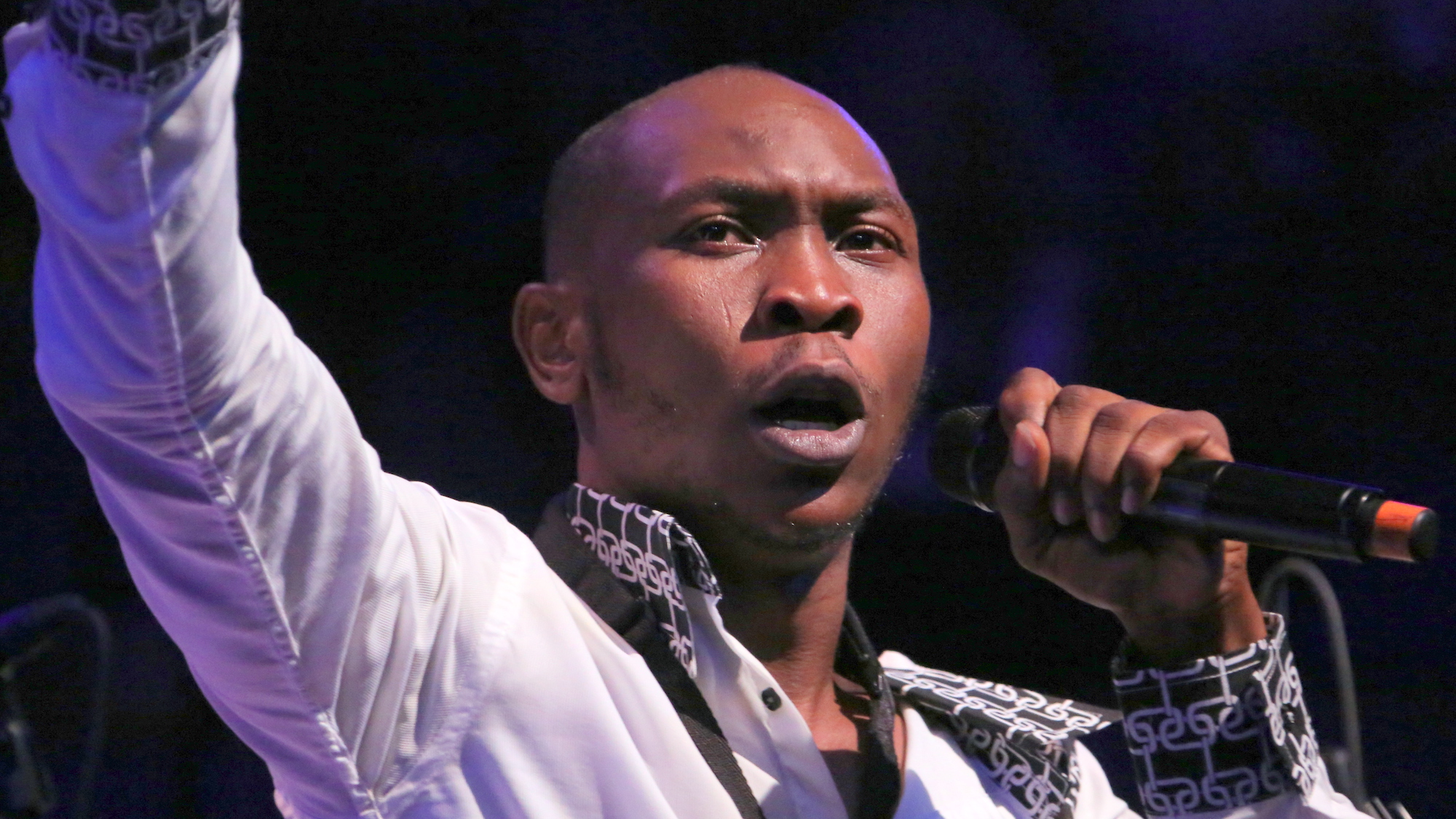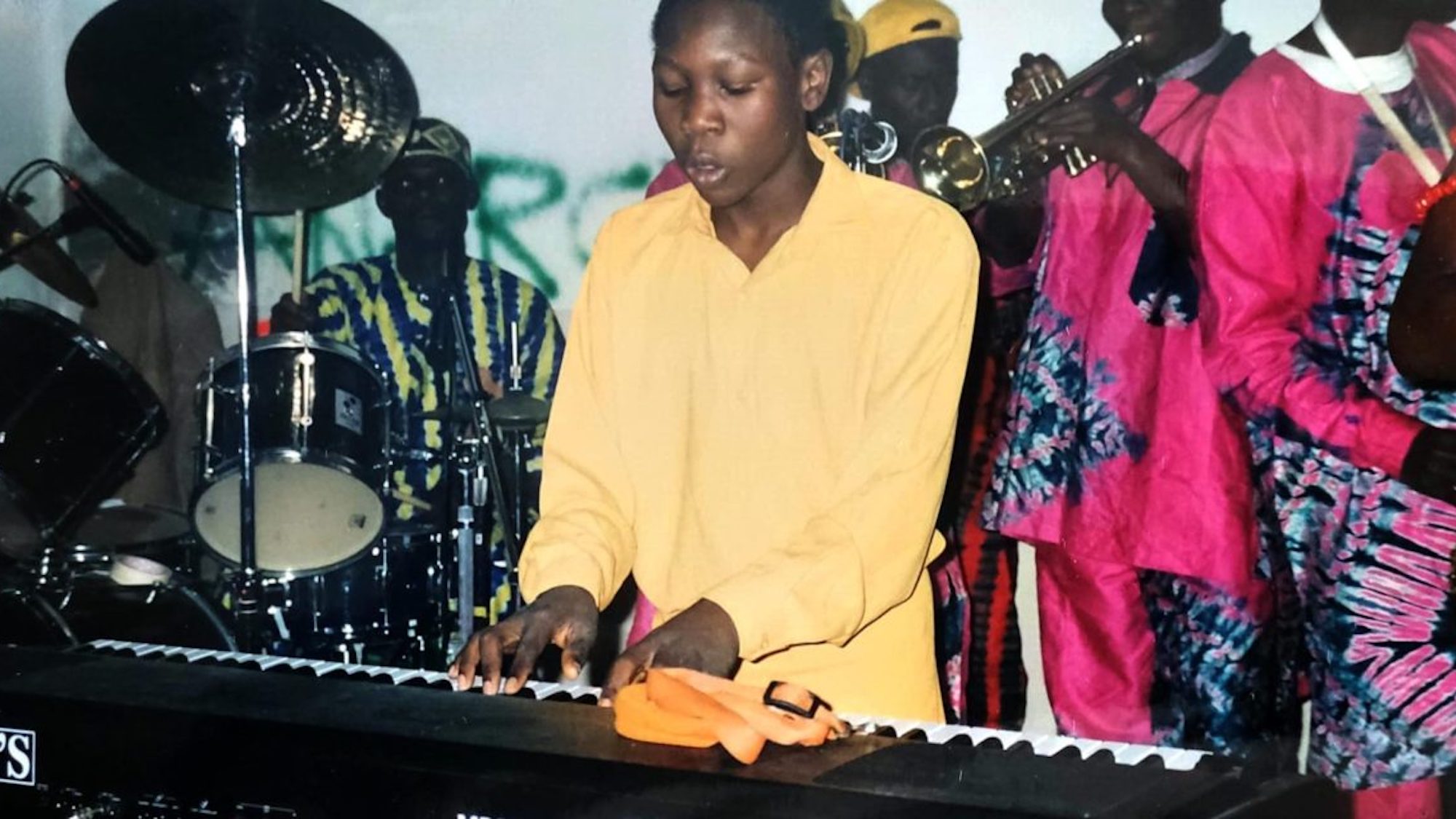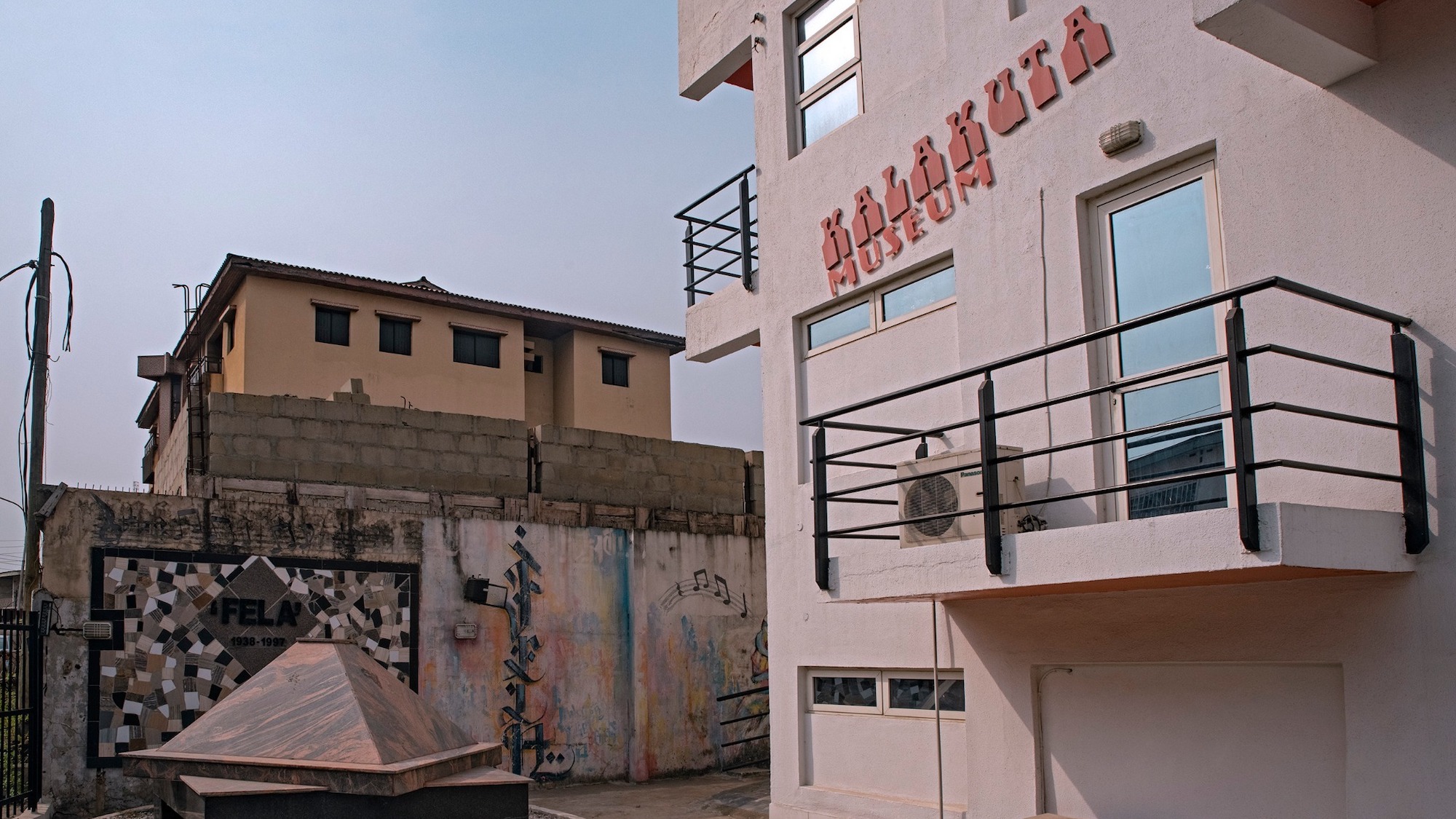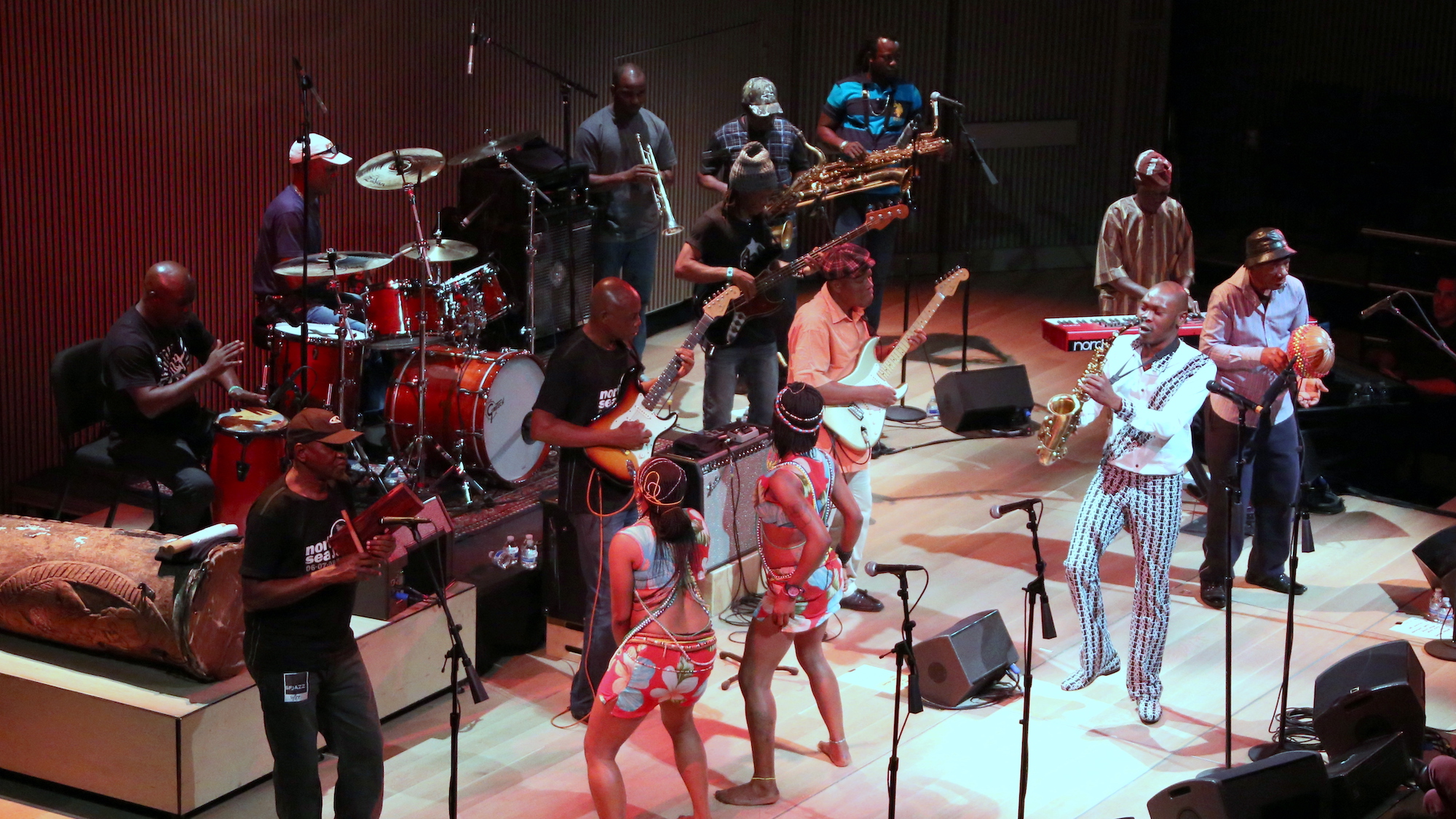July 01, 2024
Seun Kuti: Heir to the Afrobeat Legacy
By Emmanuel Nado
For July’s featured article, journalist and radio host Emmanuel Nado spoke to Nigerian Afrobeat superstar Seun Kuti ahead of his Summer Sessions performances, 7/18-19.

Seun Kuti at SFJAZZ, 6/19/2014 (photo by Rick Swig)
Fans of Afrobeat music will have much to cheer about in San Francisco this coming July 18 and 19. Seun Kuti, one of Africa’s brightest stars, will take to the stage of the iconic jazz institution SFJAZZ here in the Bay Area. He is the son of an African legend Fela Aníkúlápó Kuti, creator of the enduring African music style that has spread throughout the globe.
To talk about Seun without mentioning his father will not be doing justice to the legacy of this African music giant. Without Fela, there wouldn't have been Afrobeat. In fact, he is Afrobeat. Of all African musicians, he needs the least introduction. It was at the end of the 1960s that Fela created Afrobeat with his drummer Tony Allen by fusing, among other things, jazz, funk, highlife, and traditional Yoruba rhythms (Yoruba is the language spoken by the ethnic Yoruba people of southwestern and central Nigeria.) Fela dedicated his whole musical life to the fight against oppression and it is this protesting spirit through music that reigns over several decades and continues through his sons.
I recently spoke with Seun Kuti as he was beginning his 2024 summer U.S. tour on the East Coast. “I am very excited to be back at SFJAZZ. It is where I had my first sold out show when I toured America for the first time several years ago. I found the audiences fantastic; they are attuned to the rhythm of Afrobeat.”

Seun Kuti performing with Egypt 80 in Italy at age 16, 1998.
One cannot understand the musical work of Seun Kuti without understanding the life and political trajectory that shaped it.
At 8, Seun joined his father’s orchestra as a backing vocalist and later learned to play saxophone and piano. He grew up in the Kalakuta Republic, a community founded by his father in Lagos, Nigeria that housed his family, band members and a recording studio. Living among his family, his father’s musicians, wives, singers and dancers, and many relatives was a great education. “Growing up there was like going to the university of life,” he says. He always knew that their environment and the community were different because many of the things that were hedging to society and many of the things that society rejected were the same things that the people in Kalakuta Republic rejected. Living with people who were not necessarily family, in terms of bloodline, opened his eyes to various kinds of relationships with other people.
These kinds of interactions shaped his own view not only of the stereotype of humanity, but for the real hope of what humanity could be like when people live together with one goal and one ambition.

The former Kalakuta Republic compound in Lagos, Nigeria, which now houses the Fela Kuti museum
Seun Kuti has become the main herald of Afrobeat in the world, a committed artist who defends human rights in Africa, denouncing political and economic corruption, the greed of multinationals and the non-Pan-Africanist leaders in the continent as his father did throughout his career. He has a knack for poignant lyrics, straight to the point. In his family, political involvement is necessary – it is like a registered trademark. Both Seun and his older brother Femi Kuti claim this musical heritage.
When asked why many of the things his father spoke about several decades ago still happen today on the continent, Kuti says unequivocally, “Things that he spoke out about are happening today not because he said it. They are happening because Africans have not decided to have a reckoning with their own reality. African-American intellectual Dr. Amos Wilson said, ‘Africans have to live out of their minds. If we delve deep into our minds, we will take responsibility to change the world and the maturity of us Africans all over the world are not ready for this reckoning.’”
He says this opened his eyes to the psychological aspects of the Pan-African struggle, to the remarkably high degree of indoctrination of Africans, the economic degradation, and the political inertia of our leaders. Dr. Amos Wilson is one of the black theorists who shaped his thinking.
All of Seun Kuti’s albums have a Pan-Africanism theme. With Black Times, his 2018 GRAMMY-nominated album, he goes deeper to a level that is more articulate with more lyrical delivery where he musicalized his thoughts better than when he could when he was young. The title of the album is a desire for unity of black people as theorized by W.E. Du Bois in his seminal work The Souls of Black Folk. He says, “We black people need to understand who we are. We need to know our own history and who we really are.” In Black Times, Seun refers to some of the early Pan-Africanism leaders Shaka Zulu, Patrice Lumumba, Kwame Nkrumah, Gamal Abdel Nasser, and Thomas Sankara. In addition, Marcus Garvey, Ahmed Sékou Touré, Stokely Carmichael (aka Kwame Ture), and his own uncle Beko Ransome-Kuti influenced him.
With his musicians of Egypt 80 he maintains his family legacy of social consciousness, and by remaining faithful to his father’s memory, he perpetuates the spirit of Afrobeat.
The band still has a few original members, and though the personnel changed over time, the ideal remains. For Seun, Egypt 80 is an ideal. “It is the band that makes the musicians, not the musicians that make the band when it comes to Egypt 80. It has become an African music institution.” Playing a mixture of traditional Nigerian music, jazz, funk, percussion, call and response vocal styles, dancing with irresistible rhythm and dazzling brass riffs à la James Brown, Seun's music has a unique power to move and unite. He explains, “In all African music, there is a strong spirit that makes it powerful and energetic. It is in us. It comes from our guts, from our authenticity.”

Seun Kuti and Egypt 80 performing at SFJAZZ, 6/2014. (photo by Rick Swig)
As for African music artistry, Seun says that for art to be an art, it must not be in the conversational sense, not even in the legal sense but for it to be art it must be in a natural and universal sense. Adding “I think that’s what stands most artists apart from those who pretend to be artists.” He believes that African artists have a cultural and political responsibility to the audience. Everyone has a responsibility to try to make a difference no matter what they do. His activism, he says, has to do with empowering the people with a sense that they can make a difference in their own life and that of others.
Seun Kuti and Egypt 80 perform 7/18-19 at SFJAZZ as part of Summer Sessions 2024. Tickets and more information are available here. The 7/19 performance will be broadcast at sfjazz.org as part of our Fridays Live series. More information is available here.
Hailing from Cote d’Ivoire in West Africa, journalist, promoter, and radio producer Emmanuel Nado is at the forefront of promoting African music and culture in the San Francisco Bay Area. He currently hosts AfricaMix on KALW Radio 91.FM San Francisco, Saturdays from 7-9pm PT.
